Ukraine leader Yatsenyuk offers powers to troubled east
- Published
The BBC's David Stern in Donetsk: "There's a definite undercurrent of tension"
Ukraine's interim prime minister has offered to devolve more powers to eastern regions, where pro-Russian separatists are defying the government.
He is holding talks with regional leaders in Donetsk, where activists demanding self-rule are holding a big government building.
It is not clear if Arseniy Yatsenyuk's offer will satisfy the separatists.
The threat of Russia cutting gas deliveries has now prompted Ukraine to seek gas from French and German firms.
The EU says it can pump gas back to Ukraine with reverse-flow pipeline technology. Usually the Russian gas flows to Europe via Ukraine.
Interim Ukrainian Prime Minister Arseniy Yatsenyuk: "We've made an offer... but it's up to them [the separatists] to decide"
In Kiev, Ukraine's Energy Minister Yuri Prodan said it would seek the gas "on the conditions offered by European gas companies", which he named as Germany's RWE and "a French gas company".
On Thursday, Russia's President Vladimir Putin said in a letter to 18 European countries, external that gas supplies to Ukraine could be cut if Kiev did not pay off its debts, and warned this could affect gas deliveries to Europe.
In 2009 a Russian gas dispute with Ukraine led to gas shortages in several European Union countries.
Gazprom says Ukraine owes it $2.2bn (£1.2bn; 1.4bn euros) and recently doubled the price it must pay.
Could Russia turn off the taps? The BBC's Daniel Sandford reports
The US has accused Russia of using energy "as a tool of coercion" over Ukraine, and says it is working to help Ukraine find gas and financing.
Tense stand-off
In Donetsk, Mr Yatsenyuk urged regional leaders to tell locals that the Kiev government would ensure security and economic progress in the east, Interfax news agency reports.
"In the framework of the changed constitution, we will be able to satisfy specific requests of every single region," he pledged.
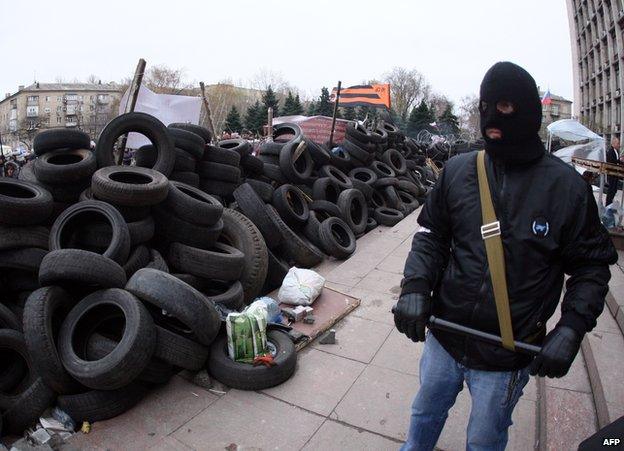
Donetsk: Pro-Russian activists man barricades around the regional government building
But Kiev has rejected Russian pressure to turn Ukraine into a loose federation, fearing that more regions could break away and join Russia.
The separatist protest follows Russia's annexation of Crimea last month - described as the biggest political confrontation in Europe since the end of the Cold War.
Washington on Friday announced a third round of sanctions against individuals it has linked to the separation of Crimea from Ukraine.
The US Treasury said it had frozen the US-based assets of one former Ukrainian official, a Crimea-based energy firm and six Crimean leaders, including the chairman of the Crimea electoral commission and the mayor of Sevastopol.
Near Donetsk on Friday seven miners died in a gas explosion, apparently unrelated to the current tensions.
The mainly Russian-speaking region is dominated by Soviet-era coal-mining and heavy industry.
Mr Yatsenyuk pledged that the Russian language would keep its official status in the region, in parallel with Ukrainian.
Language is a highly sensitive issue in eastern Ukraine, where ties with Russia are strong.
The billionaire industrialist Rinat Akhmetov - reckoned to be Ukraine's richest man - is participating in the talks.
Russian forces
Nato says up to 40,000 Russian troops are massed near Ukraine's eastern border.
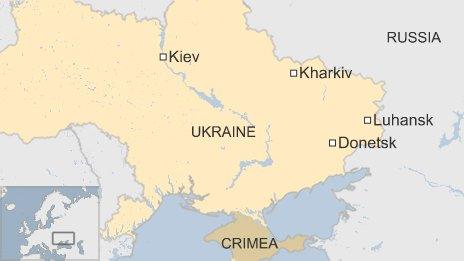
Russian Foreign Minister Sergei Lavrov called for legal guarantees of Ukraine's neutrality, reminding Nato that it should not try to draw Ukraine into the alliance.
Mr Yatsenyuk is also expected to travel to another eastern city, Dnipropetrovsk, which has also seen protests.
Activists in Ukraine's mostly Russian-speaking east have also been occupying a state security building in the city of Luhansk, with gunmen armed with Kalashnikov assault rifles among them.
Ukrainian officials are trying to negotiate a deal whereby the protesters would vacate the buildings in return for protection from prosecution.
The interim government accuses Russia of orchestrating the unrest, as a provocation similar to the anti-Kiev protests which gripped Crimea. Russia denies the claim.
It has been announced that next week's talks between Russia, Ukraine, the US and the EU - the first four-way discussions since the crisis began - will take place on 17 April in Geneva.
Last November Ukraine's former President Viktor Yanukovych - an ally of Russia - refused to sign a far-reaching partnership treaty with the EU. That triggered huge anti-Yanukovych demonstrations and violence which led to him fleeing to Russia in February.
Separately, Nato has defended the accuracy of satellite images which it says show Russian troops massed on the Ukrainian border, external in recent weeks.
A Russian official earlier said the images depicted a military exercise that was held in August last year.
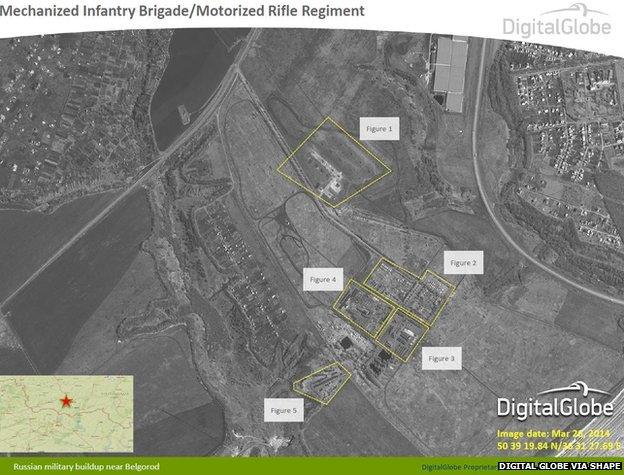
Nato has released satellite images of the Russia/Ukraine border areas. It says the areas highlighted show troops near Belgorod, south-western Russia, on 26 March 2014
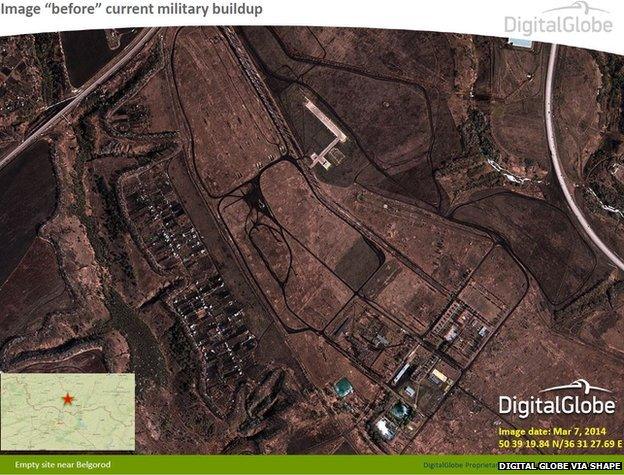
This image of the same location taken earlier in the month - on 7 March - shows a somewhat emptier site
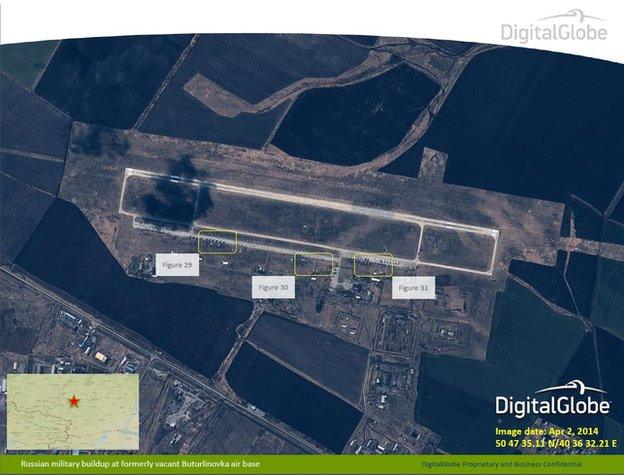
This photo, taken on 2 April, purportedly shows Russia's build-up at the formerly vacant Buturlinovka air base, some 90 miles (145km) from Ukraine border